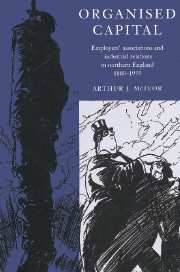Book contents
- Frontmatter
- Contents
- List of maps and tables
- Acknowledgements
- List of abbreviations
- Introduction
- Part 1 Setting the scene
- Part 2 Forging employers' organisations, 1880–1920
- Part 3 Reacting to the economic slump, 1920–39
- 7 The millowners' counter-attack
- 8 Stabilising labour markets: building
- 9 Defending managerial prerogative: engineering
- Conclusion
- Bibliography
- Index
9 - Defending managerial prerogative: engineering
Published online by Cambridge University Press: 14 October 2009
- Frontmatter
- Contents
- List of maps and tables
- Acknowledgements
- List of abbreviations
- Introduction
- Part 1 Setting the scene
- Part 2 Forging employers' organisations, 1880–1920
- Part 3 Reacting to the economic slump, 1920–39
- 7 The millowners' counter-attack
- 8 Stabilising labour markets: building
- 9 Defending managerial prerogative: engineering
- Conclusion
- Bibliography
- Index
Summary
This chapter examines the industrial relations policies of engineering Employers' associations during the inter-war economic recession. A key issue taken up is how the industry responded to economic change - first the sharp and sustained economic recession and later the rapid recovery which came with rearmament from the mid-1930s. Previous published studies have tended to concentrate upon the national, industry-wide perspective, with the debate pivoting on the question of employers' collective authority and power during the slump. One interpretation stresses the altered balance of power in the employers' favour during the 1920-35 period. Gospel posits that, despite serious divisions within engineering employers' ranks, their organisations exploited the enhanced bargaining power conferred by market developments and the collapse of trade unionism to play a primary role in structuring industrial relations during these years. Zeitlin argues, conversely, that engineering employers' organisations between the wars were weakened by internal strife and patently failed to influence industrial relations at all levels – within the workplace, the local labour market and at the national/political level. According to Zeitlin, engineering employers were unable to exploit the success of the 1922 national lock-out to ‘Americanise’ industrial relations and achieve a transformation in the division of labour in the industry. Hence, the industry's long-term competitiveness was fundamentally compromised.
The aim here is to examine such interpretations critically in the light of detailed evidence from a single region. Thus developments within engineering factories and within local labour markets are brought more sharply into focus, whilst internal divisions within the engineering employers' power bloc will be identified.
- Type
- Chapter
- Information
- Organised CapitalEmployers' Associations and Industrial Relations in Northern England, 1880–1939, pp. 233 - 269Publisher: Cambridge University PressPrint publication year: 1996



